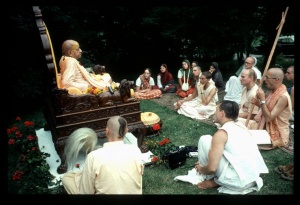SB 10.47.19: Difference between revisions
m (1 revision(s)) |
(Vanibot #0054 edit - transform synonyms into clickable links, which search similar occurrences) |
||
| (One intermediate revision by one other user not shown) | |||
| Line 1: | Line 1: | ||
{{info | {{info | ||
|speaker= | |speaker=Śrīmatī Rādhārāṇī | ||
|listener=Uddhava and the honeybee | |listener=Uddhava and the honeybee | ||
}} | }} | ||
[[Category:Srimad-Bhagavatam - Canto 10 Chapter 47]] | |||
[[Category:Bhagavatam Verses Spoken by Srimati Radharani - Vanisource|104719]] | |||
<div style="float:left">'''[[Srimad-Bhagavatam]] - [[SB 10|Tenth Canto]] - [[SB 10.47: The Song of the Bee|Chapter 47: The Song of the Bee]]'''</div> | |||
<div style="float:right">[[File:Go-previous.png|link=SB 10.47.18]] '''[[SB 10.47.18]] - [[SB 10.47.20]]''' [[File:Go-next.png|link=SB 10.47.20]]</div> | |||
{{RandomImage}} | |||
{{SBnotice}} | |||
==== TEXT 19 ==== | ==== TEXT 19 ==== | ||
<div | <div class="verse"> | ||
vayam ṛtam iva jihma-vyāhṛtaṁ śraddadhānāḥ | :vayam ṛtam iva jihma-vyāhṛtaṁ śraddadhānāḥ | ||
kulika-rutam ivājñāḥ kṛṣṇa-vadhvo hariṇyaḥ | :kulika-rutam ivājñāḥ kṛṣṇa-vadhvo hariṇyaḥ | ||
dadṛśur asakṛd etat tan-nakha-sparśa-tīvra | :dadṛśur asakṛd etat tan-nakha-sparśa-tīvra | ||
smara-ruja upamantrin bhaṇyatām anya-vārtā | :smara-ruja upamantrin bhaṇyatām anya-vārtā | ||
</div> | </div> | ||
| Line 17: | Line 22: | ||
==== SYNONYMS ==== | ==== SYNONYMS ==== | ||
<div | <div class="synonyms"> | ||
''[//vanipedia.org/wiki/Special:VaniSearch?s=vayam&tab=syno_o&ds=1 vayam]'' — we; ''[//vanipedia.org/wiki/Special:VaniSearch?s=ṛtam&tab=syno_o&ds=1 ṛtam]'' — true; ''[//vanipedia.org/wiki/Special:VaniSearch?s=iva&tab=syno_o&ds=1 iva]'' — as if; ''[//vanipedia.org/wiki/Special:VaniSearch?s=jihma&tab=syno_o&ds=1 jihma]'' — deceptive; ''[//vanipedia.org/wiki/Special:VaniSearch?s=vyāhṛtam&tab=syno_o&ds=1 vyāhṛtam]'' — His speech; ''[//vanipedia.org/wiki/Special:VaniSearch?s=śraddadhānāḥ&tab=syno_o&ds=1 śraddadhānāḥ]'' — trusting; ''[//vanipedia.org/wiki/Special:VaniSearch?s=kulika&tab=syno_o&ds=1 kulika]'' — of a hunter; ''[//vanipedia.org/wiki/Special:VaniSearch?s=rutam&tab=syno_o&ds=1 rutam]'' — the song; ''[//vanipedia.org/wiki/Special:VaniSearch?s=iva&tab=syno_o&ds=1 iva]'' — as if; ''[//vanipedia.org/wiki/Special:VaniSearch?s=ajñāḥ&tab=syno_o&ds=1 ajñāḥ]'' — foolish; ''[//vanipedia.org/wiki/Special:VaniSearch?s=kṛṣṇa&tab=syno_o&ds=1 kṛṣṇa]'' — of the black deer; ''[//vanipedia.org/wiki/Special:VaniSearch?s=vadhvaḥ&tab=syno_o&ds=1 vadhvaḥ]'' — wives; ''[//vanipedia.org/wiki/Special:VaniSearch?s=hariṇyaḥ&tab=syno_o&ds=1 hariṇyaḥ]'' — the doe; ''[//vanipedia.org/wiki/Special:VaniSearch?s=dadṛśuḥ&tab=syno_o&ds=1 dadṛśuḥ]'' — experienced; ''[//vanipedia.org/wiki/Special:VaniSearch?s=asakṛt&tab=syno_o&ds=1 asakṛt]'' — repeatedly; ''[//vanipedia.org/wiki/Special:VaniSearch?s=etat&tab=syno_o&ds=1 etat]'' — this; ''[//vanipedia.org/wiki/Special:VaniSearch?s=tat&tab=syno_o&ds=1 tat]'' — His; ''[//vanipedia.org/wiki/Special:VaniSearch?s=nakha&tab=syno_o&ds=1 nakha]'' — of the fingernails; ''[//vanipedia.org/wiki/Special:VaniSearch?s=sparśa&tab=syno_o&ds=1 sparśa]'' — by the touch; ''[//vanipedia.org/wiki/Special:VaniSearch?s=tīvra&tab=syno_o&ds=1 tīvra]'' — sharp; ''[//vanipedia.org/wiki/Special:VaniSearch?s=smara&tab=syno_o&ds=1 smara]'' — of lust; ''[//vanipedia.org/wiki/Special:VaniSearch?s=rujaḥ&tab=syno_o&ds=1 rujaḥ]'' — the pain; ''[//vanipedia.org/wiki/Special:VaniSearch?s=upamantrin&tab=syno_o&ds=1 upamantrin]'' — O messenger; ''[//vanipedia.org/wiki/Special:VaniSearch?s=bhaṇyatām&tab=syno_o&ds=1 bhaṇyatām]'' — please speak; ''[//vanipedia.org/wiki/Special:VaniSearch?s=anya&tab=syno_o&ds=1 anya]'' — another; ''[//vanipedia.org/wiki/Special:VaniSearch?s=vārtā&tab=syno_o&ds=1 vārtā]'' — topic. | |||
</div> | </div> | ||
{{SBcollapse}} | |||
==== TRANSLATION ==== | ==== TRANSLATION ==== | ||
<div | <div class="translation"> | ||
Faithfully taking His deceitful words as true, we became just like the black deer's foolish wives, who trust the cruel hunter's song. Thus we repeatedly felt the sharp pain of lust caused by the touch of His nails. O messenger, please talk about something besides Kṛṣṇa. | Faithfully taking His deceitful words as true, we became just like the black deer's foolish wives, who trust the cruel hunter's song. Thus we repeatedly felt the sharp pain of lust caused by the touch of His nails. O messenger, please talk about something besides Kṛṣṇa. | ||
</div> | </div> | ||
| Line 31: | Line 36: | ||
==== PURPORT ==== | ==== PURPORT ==== | ||
<div | <div class="purport"> | ||
Śrīla Viśvanātha Cakravartī categorizes this statement of Śrīmatī Rādhārāṇī's as ājalpa, as defined by Śrīla Rūpa Gosvāmī: | Śrīla Viśvanātha Cakravartī categorizes this statement of Śrīmatī Rādhārāṇī's as ''ājalpa'', as defined by Śrīla Rūpa Gosvāmī: | ||
:jaihmyaṁ tasyārti-datvaṁ ca | :''jaihmyaṁ tasyārti-datvaṁ ca'' | ||
:nirvedād yatra kīrtitam | :''nirvedād yatra kīrtitam'' | ||
:bhaṅgyānya-sukha-datvaṁ ca | :''bhaṅgyānya-sukha-datvaṁ ca'' | ||
:sa ājalpa udīritaḥ | :''sa ājalpa udīritaḥ'' | ||
"A statement spoken in disgust, describing how the male lover is deceitful and brings one misery, and also implying that He gives happiness to others, is known as ājalpa." (Ujjvala-nīlamaṇi 14.196) | "A statement spoken in disgust, describing how the male lover is deceitful and brings one misery, and also implying that He gives happiness to others, is known as ''ājalpa''." (''Ujjvala-nīlamaṇi'' 14.196) | ||
</div> | </div> | ||
__NOTOC__ | </div> | ||
</div> | |||
<div style="float:right">[[File:Go-previous.png|link=SB 10.47.18]] '''[[SB 10.47.18]] - [[SB 10.47.20]]''' [[File:Go-next.png|link=SB 10.47.20]]</div> | |||
__NOTOC__ | |||
__NOEDITSECTION__ | |||
Latest revision as of 19:15, 17 February 2024

A.C. Bhaktivedanta Swami Prabhupada
Please note: The synonyms, translation and purport of this verse were composed by disciples of Śrīla Prabhupāda
TEXT 19
- vayam ṛtam iva jihma-vyāhṛtaṁ śraddadhānāḥ
- kulika-rutam ivājñāḥ kṛṣṇa-vadhvo hariṇyaḥ
- dadṛśur asakṛd etat tan-nakha-sparśa-tīvra
- smara-ruja upamantrin bhaṇyatām anya-vārtā
SYNONYMS
vayam — we; ṛtam — true; iva — as if; jihma — deceptive; vyāhṛtam — His speech; śraddadhānāḥ — trusting; kulika — of a hunter; rutam — the song; iva — as if; ajñāḥ — foolish; kṛṣṇa — of the black deer; vadhvaḥ — wives; hariṇyaḥ — the doe; dadṛśuḥ — experienced; asakṛt — repeatedly; etat — this; tat — His; nakha — of the fingernails; sparśa — by the touch; tīvra — sharp; smara — of lust; rujaḥ — the pain; upamantrin — O messenger; bhaṇyatām — please speak; anya — another; vārtā — topic.
Translation and purport composed by disciples of Śrīla Prabhupāda
TRANSLATION
Faithfully taking His deceitful words as true, we became just like the black deer's foolish wives, who trust the cruel hunter's song. Thus we repeatedly felt the sharp pain of lust caused by the touch of His nails. O messenger, please talk about something besides Kṛṣṇa.
PURPORT
Śrīla Viśvanātha Cakravartī categorizes this statement of Śrīmatī Rādhārāṇī's as ājalpa, as defined by Śrīla Rūpa Gosvāmī:
- jaihmyaṁ tasyārti-datvaṁ ca
- nirvedād yatra kīrtitam
- bhaṅgyānya-sukha-datvaṁ ca
- sa ājalpa udīritaḥ
"A statement spoken in disgust, describing how the male lover is deceitful and brings one misery, and also implying that He gives happiness to others, is known as ājalpa." (Ujjvala-nīlamaṇi 14.196)